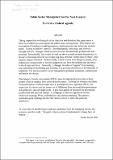Public sector management for the next century: towards a radical agenda
Abstract
Taking responsible wellbeing for all as objective and direction, this paper seeks a
basis for a radical pro-poor agenda for public sector management. This follows the
convention of standing normal bureaucracy, professionalism and behaviour on their
heads. It seeks to achieve three Ds - decentralisation, democracy and diversity -
through three Ps - changes which are procedural (or institutional), professional and
personal. Procedurally, this inverts normal top-down control-oriented bureaucracy in
favour of minimum rules for self-organismg local systems "on the edge of chaos", and
replaces targets with trust. Professionally, it shifts values from things to people, from
reductionist measurement to holistic judgement, and from the uniform and universal
to the diverse and local. Personally, it changes the roles of "uppers" from teaching
and controlling to facilitating and enabling. The personal dimension in development is
neglected. For pro-poor public sector management, personal awareness, commitment
and action are crucial.
Participatory Poverty Assessments (PPAs) have revealed policy priorities of poor
people, often at variance from those of professionals. Drawing on evidence and ideas
from participatory methodologies such as participatory rural appraisal (PRA), the
paper asks to what extent the incentives of fulfilment from personal disempowennent
and generosity can outweigh losses. A pro-poor agenda is proposed for procedural,
professional and personal change. A pedagogy for the non-oppressed stresses
immersion learning, PPAs, and behaviour and attitudes training. The greatest
methodological challenge for the 21 st century is how to tackle the personal
dimension.
"It is not that we should simply seek new and better ways for managing society, the
economy and the world. The point is that we should fundamentally change how we
behave"
Vaclav Havel 1992

